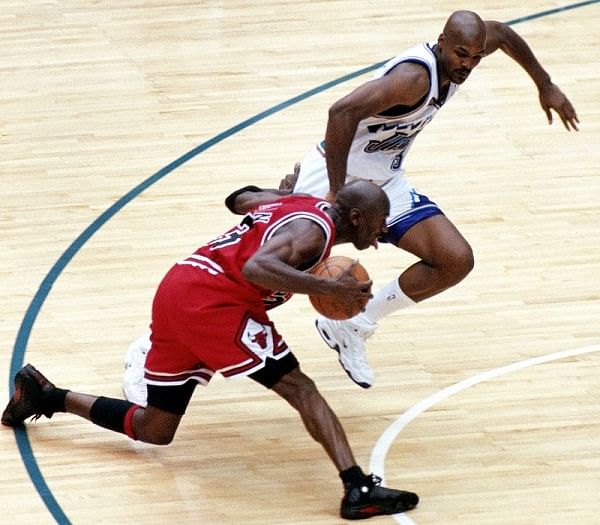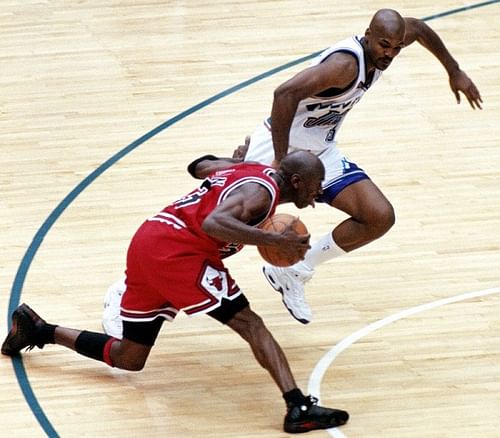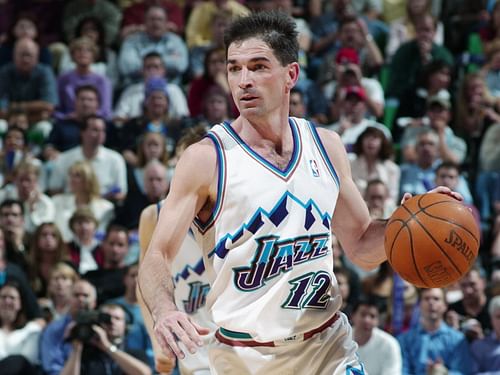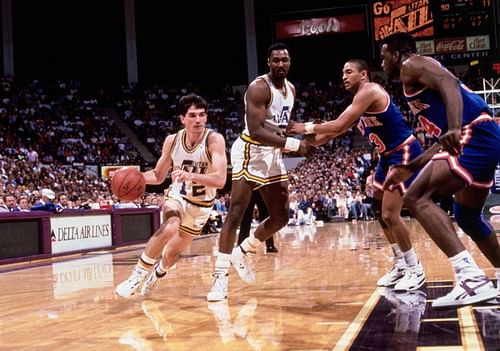
The Ordinary Legend: John Stockton

Game 6, 1998 NBA Finals
Scene: Game 6, 1998 NBA Finals – the historic series has witnessed an enthralling duel between the high-flying Bulls and the tenacious Utah Jazz. The Bulls led the series by 3-2. The dying seconds of the game, with 14.5 seconds left on the clock, the scoreboard read 86-85 in favor of the Jazz.
Michael Jordan has just stolen the ball off Malone and is hustling in a semi-transition situation. The Jazz defense is staggered and disoriented. To snuff out the attack, the defense adjusts but not so wisely as the great is in a one-on-one situation with Byron Russell.
The picture above is a silent reminder of what happens to be the most quintessential and paramount basketball moment of all time. The image shows the legendary No. 23 on the verge of executing his much-famed killer cross-over move on Russell.
As he steps back and slightly pushes off, the helpless Russell struggles to keep his ground and staggers to a halt. He is off-balance and not in a state to contest Jordan, who rises up and drains a foul-line jump-shot. And as the ball floated up in the air so did the hopes and chimeras of the entire Salt Lake City.
The whole city prayed against Jordan, but to no avail as Jordan tortured the hapless Utah Jazz defense with his wide array of attacking talents. When he came up into the Utah half with the ball in his hands, everyone in Utah hoped against hope, wishing that maybe the dream-like career of Jordan be deprived of a fairytale ending.
However, the script did indeed have a perfect end, maybe the best possible sending off. Michael rode off into immortality, leaving behind memories of maybe the greatest clutch shot of all time.
But the point isn’t to rave about the hyperbolic basketball ability of Jordan, because they have been well documented and his legend very well eulogized. The aim here is to concentrate on another player who in spite of his greatness is still fighting against obscurity and anonymity. The player in question had the chance to extirpate the fairytale ending. If Michael had been torturing the Jazz on one end, he in his own signature characteristic style had kept the Jazz in the game. The player is none other than John Stockton, the ordinary legend.
He had knocked down the Jazz’s last basket, hitting a clutch 3-pointer with 45 seconds left in the game. And after Michael’s jumper had gone through the ring, there were still 4.5 seconds left in the game. Time still to win the game, to give the Jazz another shot at forcing a game 7. The whole stadium knew who would have the ball, and as he caught the in-bound pass, the whole arena was on its feet.
He rose up and launched a three-pointer and with his shot rose the hopes and dreams of the entire Salt Lake City, the pain and anguish of last season’s finals loss to the Bulls still fresh in their minds and hearts, and their desperate wish to see their team avenge the same.
The moment of vindication had arrived, but maybe Michael was always destined for the perfect end. As the ball bounced off the iron and Michael sprinted down the court signalling 6 with his hands, the whole city let out a lugubrious sigh of pain. The great one had come back to haunt them again.
The whole basketball fraternity present in Salt Lake City would however easily get over the anguish and disappointment of their team’s loss and join in celebrating and directing their homage and reverence to the transcendental and bedizened superstar. Michael walked off into the glorified path of legends, and retired as the greatest of all time.
Much deserved and undisputed was his status and the laurels bestowed upon him, but amidst all the spangle and embellishment not much attention was directed to Stockton, the player who had missed the shot. He had faltered on the last step again, and cast a desolate and solemn figure on the other end of the court. He had a reputation of being one of the best clutch shooters in the game, and knew this miss was a one-off, but the magnitude of the shot would leave a permanent blotch on what was a truly remarkable career.
So much so that he who deserves to be regarded among the best point guards ever to play the game and given a rostrum similar to the likes of Jordan, Magic and Isiah, doesn’t even feature at a level similar to Jason Kidd and Gary Payton. A basketball Hall-of-Famer, the all-time leader in assists and steals, but still not good enough to be considered a legend.
Stockton’s achievements make him a statistical legend, but for the hierarchy-driven and ever speculative basketball fraternity, the only path to basketball immortality is by winning championships. Maybe the reason why a Bill Russell will always be regarded greater than a Kareem Abdul Jabbar, or why a Magic Johnson is greater than Larry Bird, and the even more scandalous remark about Jason Kidd being better than John Stockton.
There is no real need to do compare Kidd and Stockton, but I’ll do it anyway. For all those people who like to judge players by the number of championships and believe a single ring riding on the back of Dirk Nowitzki makes Jason Kidd a greater player, here are some numbers to reckon with. Stockton holds the NBA record for the most number of assists as well as for the most number of steals. Over his 18 year career, he has a total of 15,806 assists at an average of 10.5 assists per game, something that only Magic bettered in the whole history of the NBA. Jason Kidd on the other hand, even though having had a truly remarkable career in the NBA falls behind Stockton on most stats. The fact that he has one ring surely can’t over-ride the other stats that Stockton schools him in.
Let aside the unimportant comparison to Kidd, Stockton led the league in assists for 9 consecutive seasons between 1987-96. It was during this time that Magic and Isiah were playing their best basketball. And for an undersized guard, he was a real tough nut. Testimony to his outlandish grit, strength and durability is his unbelievable record of having notched a record 1504 games over a period of 19 years for the Utah Jazz.

“Stock” : The simplistic superstar
Yes, he wasn’t flashy enough to dominate the highlight reel as Magic’s brand of showtime basketball, but then again the slash and dash wasn’t something that you expect out of Stockton. He wasn’t your perennial trend-setter. He didn’t dunk the ball, there were no cross-overs in his game, and he didn’t try to throw the no-look passes. Maybe the only trend he ever set was his affinity for the “Shorty Shorts” that he made popular. But even those didn’t reflect anything other than his old school philosophy. The utter simplicity in his game was what stood him apart, and reflected his humble origins, a philosophy that he perpetuated both on court and off-court.
He wasn’t the fanciest draft pick, selected as the 16th overall pick by the Utah Jazz. He was coming off a spectacular season in college basketball averaging over 20.9 points per game on 57% shooting in his senior year. However, Gonzana was no power-house in the college scene and even before he could get to the courts, his chances were acrimoniously hacked down by an ever-speculative media. The doubters believed that the Jazz were making a gamble in choosing the diminutive PG so early in the draft. His abilities though being fortified by some amazing numbers yet remained unchallenged, his temperament untested.
The pundits didn’t care much to rave about his talents, choosing to direct the spotlight on his glamorous and far more celebrated team-mates But, the old school guard never had an issue with that. And all the reasons for that can be traced back to his bedevilling introduction to the sport.
The youngest son of a saloon keeper, his first introduction to the game came on the streets, among the rumble and tumble of the driveways, jostling for supremacy with players far bigger and much older. But, the elementary and diminutive kid in him bore an irrepressible spirit that would drive him to play harder rather than complain. As a 9th grader he would call out the players in the local gym and try to beat players in their mid-twenties. Insolent and brash as it may sound, the surprising part was that he could do it as a teenager.
And it was amidst these unremitting bullies’ that Stockton discovered his strength, prevailing over the limitations of size and strength, by developing an uncanny ability to create and find openings. His tutelage at the local gym taught him the old school way of basketball, in which the basic philosophy was to make the maximum of the team’s offensive abilities and try to create better shots rather than try to patronize the better player. The idea was to play basketball in a simple and the most effective way, something that he showcased to great effectiveness in his time with Malone and Hornacek. The pick and roll with Malone was most probably the Jazz’s best go-to-move for more than a decade, and nobody ever bothered to make changes to that because there was never a need to. It was too simple to be corrupted, and it is where Stockton was comfortable in and this was his greatest strength.
Stockton was a model professional who was famous to be extremely competitive and boisterous in practice. Jerry Sloan the legendary Jazz coach remarked about Stockton
All these words eulogizing Stockton seem to fail before the ever sceptical and prying eyes of the pundits. In an extremely flagrant dogma they still proclaim that the stats he built up were majorly due to the benefits of playing alongside Malone and Hornacek.

The duo of Malone and Stockton in many ways defined the pick and roll
Now, Malone was a legendary scorer. But, every legendary scorer needs a back-up, a “Robin” to help them be the Batman. And so did Malone, who needed a role player to get him the ball when he wanted to and where he wanted to. Every great scorer has always had some play-maker pulling the strings. Wilt had West; Kareem had Oscar and later on Magic. The hypocrisy that the league showcases in grading these guards over Stockton is baffling. When Magic got his double digit assists every game, nobody said that he had the luxury of playing alongside Kareem or James Worthy. West was raved about despite him playing alongside Wilt and Elgin Baylor. They are happy bowing to Magic, hailing Oscar, saluting Cousy but not even so much as recognition for the player from Gonzana. For them Stockton dishing the number of assists that he did was a rather elementary ordeal.
However, one can’t so easily over-ride Stockton’s failure to win it all. To have a one-two punch like the Jazz had is stuff that deserves legends, and the duo did fail to achieve the ultimate crowning achievement. Amidst all this disappointment and criticism Stockton’s wish to keep a low profile actually kept him in pretty good stead. Malone always had the major part of the media attention, celebrated for his foils, but also had to go through the endless criticism and shambling tirade for his failures. The media never as much paid attention to Stockton and this luxury led to some amount of complacency and easier acceptance of failure. After the game 6 loss against the Bulls, one of Stockton’s most famous quotes were. “The sun came out this morning too”. A meek sense of indifference and acceptance, something that was not acceptable from the on-court leader for the Jazz.
But one can actually understand where this statement was coming from. He knew that Michael was retiring and the Bulls would no longer be the team that humbled them for two consecutive NBA Finals. He assumed that the next season they would be the prime contenders for the Championship and were most likely to win the elusive ring. Wishful thinking maybe, but something that was common among the transcendent superstars and teams in the league when they played against Michael. When the next play-off series happened, the Jazz unfortunately came up short again and again and again.
And with the failure to win a ring, it is but expected that the great point guard will never get the approbation and acquiescence that his insuperable basketball ability and intelligence deserved. To all who had the great fortune of watching him play and tried to see the game beyond the glitter and are gifted with perspective deeper than the unimaginative bromidic hackneyed reference to stats, he will always cast an image of being a great floor general and a complete team player. Stronger than his size; a mind quicker and more decisive than any ever known, his demure nature was a strong contrast to his on-court image where he was known to be extremely combative, ready to get physical and dirty. He did the incomprehensible by rotating to the baseline and setting screens for the back-door cutters, dictating the offense on court. A great memory of his playing time would be his controversial on-court fight with David Robinson. By the time the two players were separated, the 7-foot Robinson lay mortified on the court, pummelled by a player half his size and yes he wasn’t being charitable in the encounter. Resilient, feisty and belligerent Stockton’s greatest detractors had the following things to say about him:-
“He passes too much”; “He can’t make a play all by himself”; “He isn’t selfish enough to win”; “He doesn’t shoot the ball enough”.
Criticisms that any Point Guard would give their right arm for. Maybe yes he didn’t have the killer instinct of a Michael Jordan; but then again he was a different player. He chooses to create a better shot, find the open man rather than try to beat people off the dribble and launch some signature fade-aways; not his game, not his philosophy.
As he stood up to deliver his “Thank You” speech post his hall-of-fame induction, he kept it short and thanked almost every single player that he had ever played with, the entire coaching staff, the management and almost everyone who had anything to do with the Jazz. There was no jocose or whimsical anecdotes, no unnecessary show of emotion. It was just a simple heart-felt message, no less than you would expect from the great man. The Jazz have a street named after him, have his jersey retired and also have a statue cast for him. He is much celebrated in the circles at Salt Lake City, but beyond those borders he will always remain the player who did nothing but hand the ball to Malone.
Slanderous and idiotic as it may be, he was never concerned because the game he played didn’t actually include the media or the pundits. It was just about winning and doing it in the easiest possible way. The John Stockton way.